Lonsdale Institute - BSBMGT502: CoffeeVille Performance Project
VerifiedAdded on 2023/04/22
|25
|3487
|271
Project
AI Summary
This project comprehensively analyzes the management of people performance within the context of CoffeeVille, an Australian cafe chain. The assignment begins with a business overview, outlining CoffeeVille's operational goals and objectives, followed by an exploration of relevant workplace laws, including equal employment opportunity and workplace health and safety. The core of the project focuses on designing and implementing a performance management system, encompassing goal setting, career planning, employee coaching, motivation strategies, and annual performance appraisals. A detailed job description for a Chef is provided, along with a performance agreement for an Executive Chef, outlining performance goals and key performance indicators (KPIs). The project also includes a performance review scenario and a self-reflective analysis of the student's coaching skills, identifying strengths, weaknesses, and strategies for improvement. The project integrates various management concepts, such as SMART objectives, risk analysis, and employee motivation techniques, to create a holistic approach to people management.
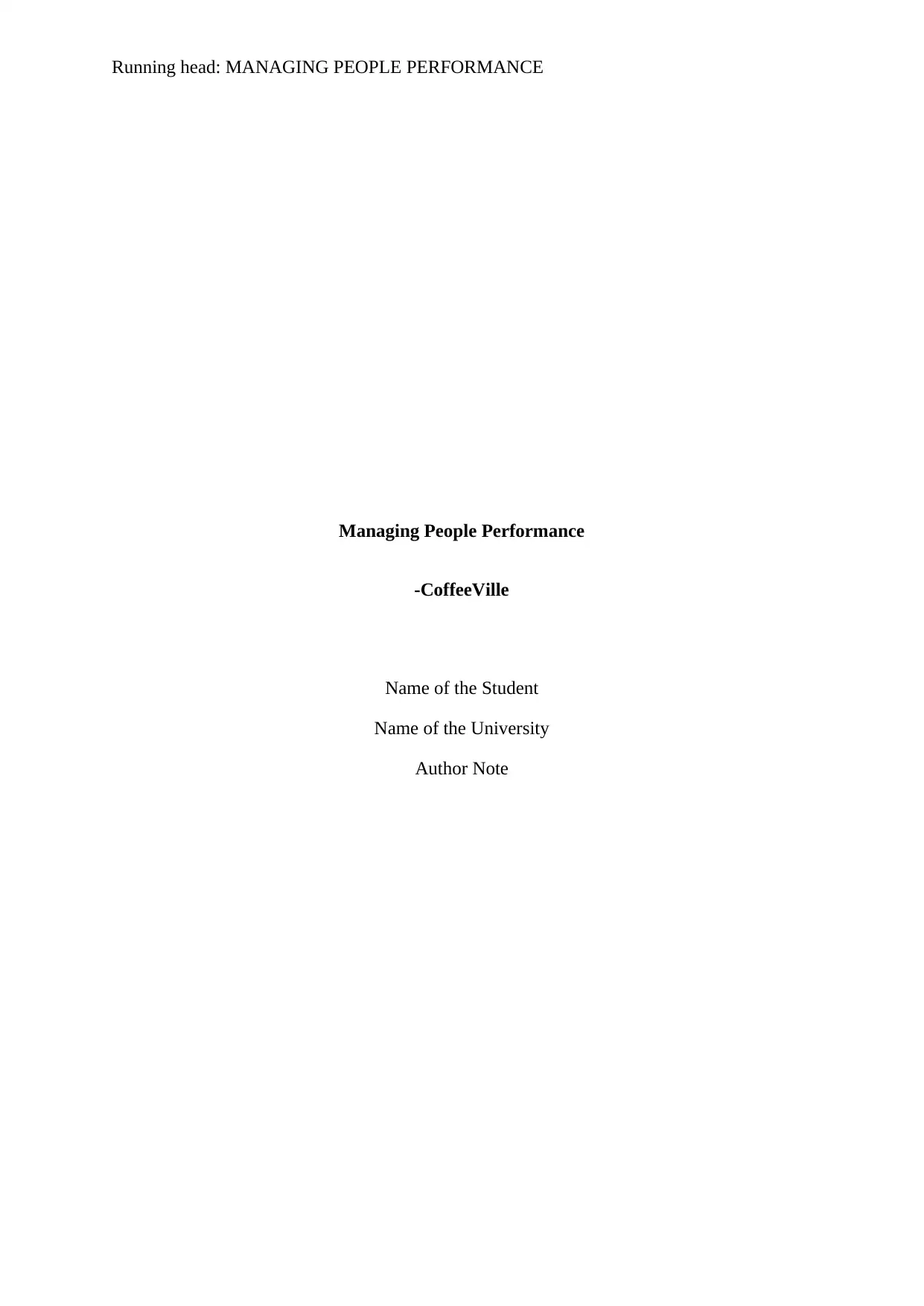
Running head: MANAGING PEOPLE PERFORMANCE
Managing People Performance
-CoffeeVille
Name of the Student
Name of the University
Author Note
Managing People Performance
-CoffeeVille
Name of the Student
Name of the University
Author Note
Paraphrase This Document
Need a fresh take? Get an instant paraphrase of this document with our AI Paraphraser
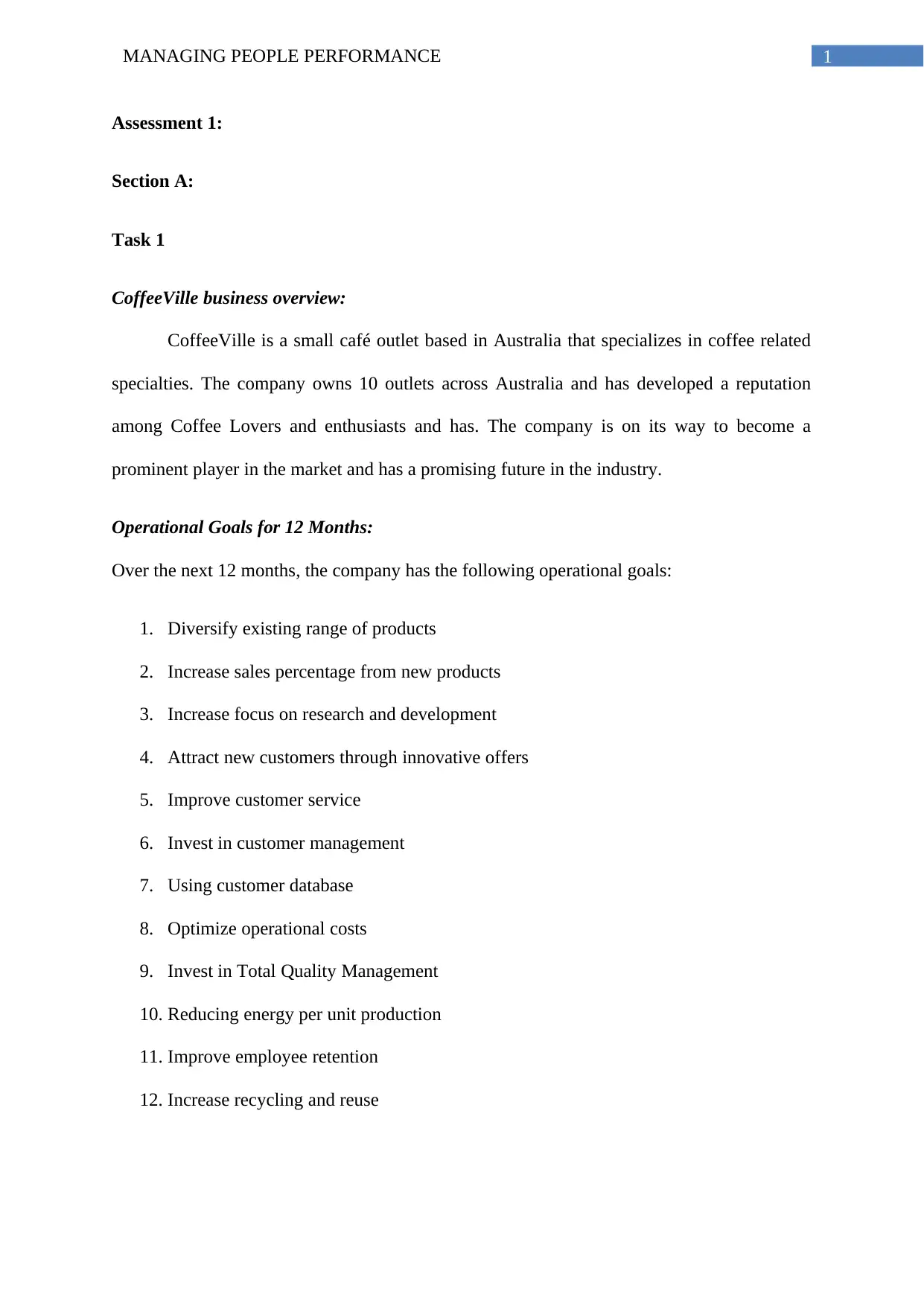
1MANAGING PEOPLE PERFORMANCE
Assessment 1:
Section A:
Task 1
CoffeeVille business overview:
CoffeeVille is a small café outlet based in Australia that specializes in coffee related
specialties. The company owns 10 outlets across Australia and has developed a reputation
among Coffee Lovers and enthusiasts and has. The company is on its way to become a
prominent player in the market and has a promising future in the industry.
Operational Goals for 12 Months:
Over the next 12 months, the company has the following operational goals:
1. Diversify existing range of products
2. Increase sales percentage from new products
3. Increase focus on research and development
4. Attract new customers through innovative offers
5. Improve customer service
6. Invest in customer management
7. Using customer database
8. Optimize operational costs
9. Invest in Total Quality Management
10. Reducing energy per unit production
11. Improve employee retention
12. Increase recycling and reuse
Assessment 1:
Section A:
Task 1
CoffeeVille business overview:
CoffeeVille is a small café outlet based in Australia that specializes in coffee related
specialties. The company owns 10 outlets across Australia and has developed a reputation
among Coffee Lovers and enthusiasts and has. The company is on its way to become a
prominent player in the market and has a promising future in the industry.
Operational Goals for 12 Months:
Over the next 12 months, the company has the following operational goals:
1. Diversify existing range of products
2. Increase sales percentage from new products
3. Increase focus on research and development
4. Attract new customers through innovative offers
5. Improve customer service
6. Invest in customer management
7. Using customer database
8. Optimize operational costs
9. Invest in Total Quality Management
10. Reducing energy per unit production
11. Improve employee retention
12. Increase recycling and reuse
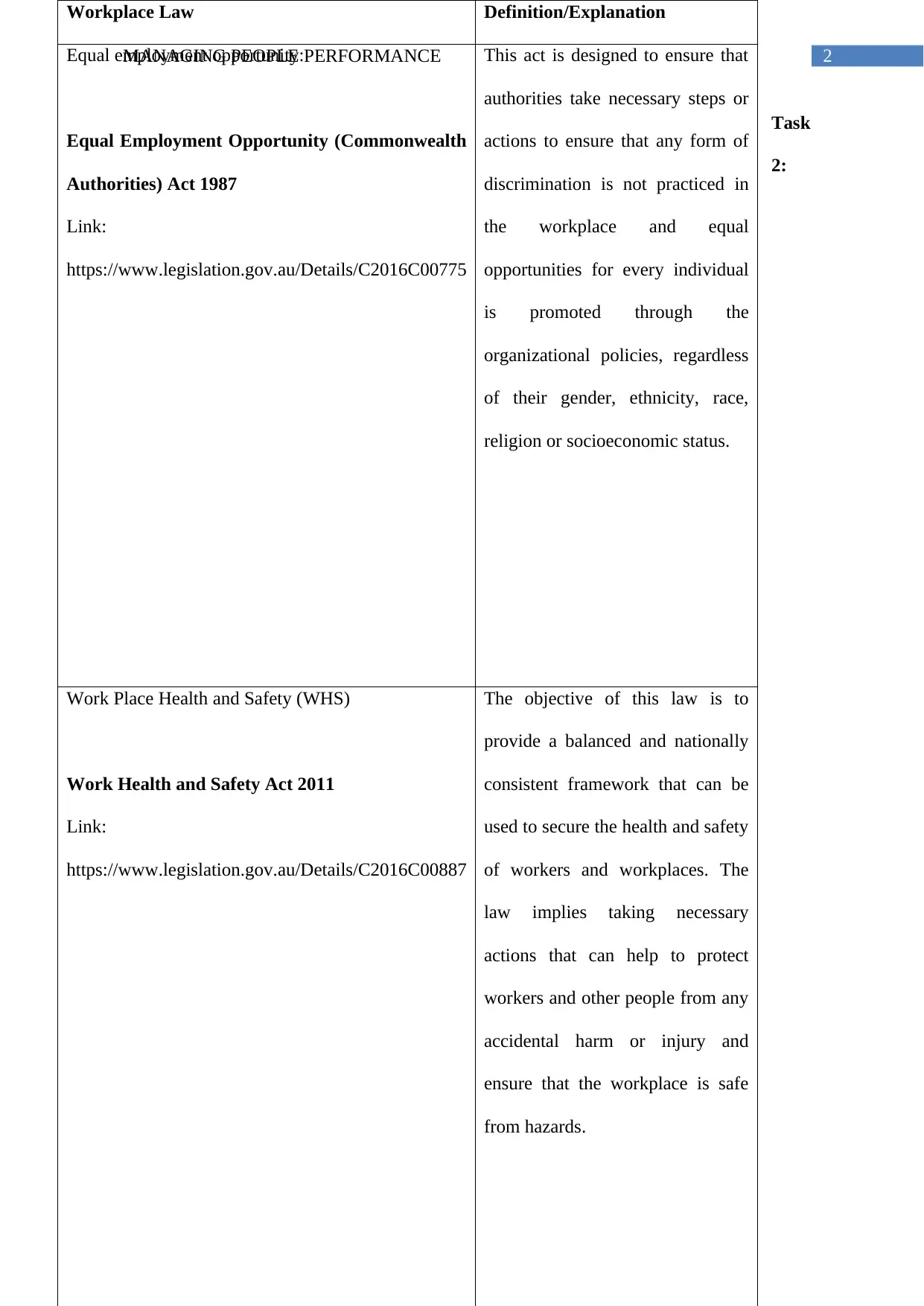
2MANAGING PEOPLE PERFORMANCE
Task
2:
Workplace Law Definition/Explanation
Equal employment opportunity:
Equal Employment Opportunity (Commonwealth
Authorities) Act 1987
Link:
https://www.legislation.gov.au/Details/C2016C00775
This act is designed to ensure that
authorities take necessary steps or
actions to ensure that any form of
discrimination is not practiced in
the workplace and equal
opportunities for every individual
is promoted through the
organizational policies, regardless
of their gender, ethnicity, race,
religion or socioeconomic status.
Work Place Health and Safety (WHS)
Work Health and Safety Act 2011
Link:
https://www.legislation.gov.au/Details/C2016C00887
The objective of this law is to
provide a balanced and nationally
consistent framework that can be
used to secure the health and safety
of workers and workplaces. The
law implies taking necessary
actions that can help to protect
workers and other people from any
accidental harm or injury and
ensure that the workplace is safe
from hazards.
Task
2:
Workplace Law Definition/Explanation
Equal employment opportunity:
Equal Employment Opportunity (Commonwealth
Authorities) Act 1987
Link:
https://www.legislation.gov.au/Details/C2016C00775
This act is designed to ensure that
authorities take necessary steps or
actions to ensure that any form of
discrimination is not practiced in
the workplace and equal
opportunities for every individual
is promoted through the
organizational policies, regardless
of their gender, ethnicity, race,
religion or socioeconomic status.
Work Place Health and Safety (WHS)
Work Health and Safety Act 2011
Link:
https://www.legislation.gov.au/Details/C2016C00887
The objective of this law is to
provide a balanced and nationally
consistent framework that can be
used to secure the health and safety
of workers and workplaces. The
law implies taking necessary
actions that can help to protect
workers and other people from any
accidental harm or injury and
ensure that the workplace is safe
from hazards.
⊘ This is a preview!⊘
Do you want full access?
Subscribe today to unlock all pages.

Trusted by 1+ million students worldwide
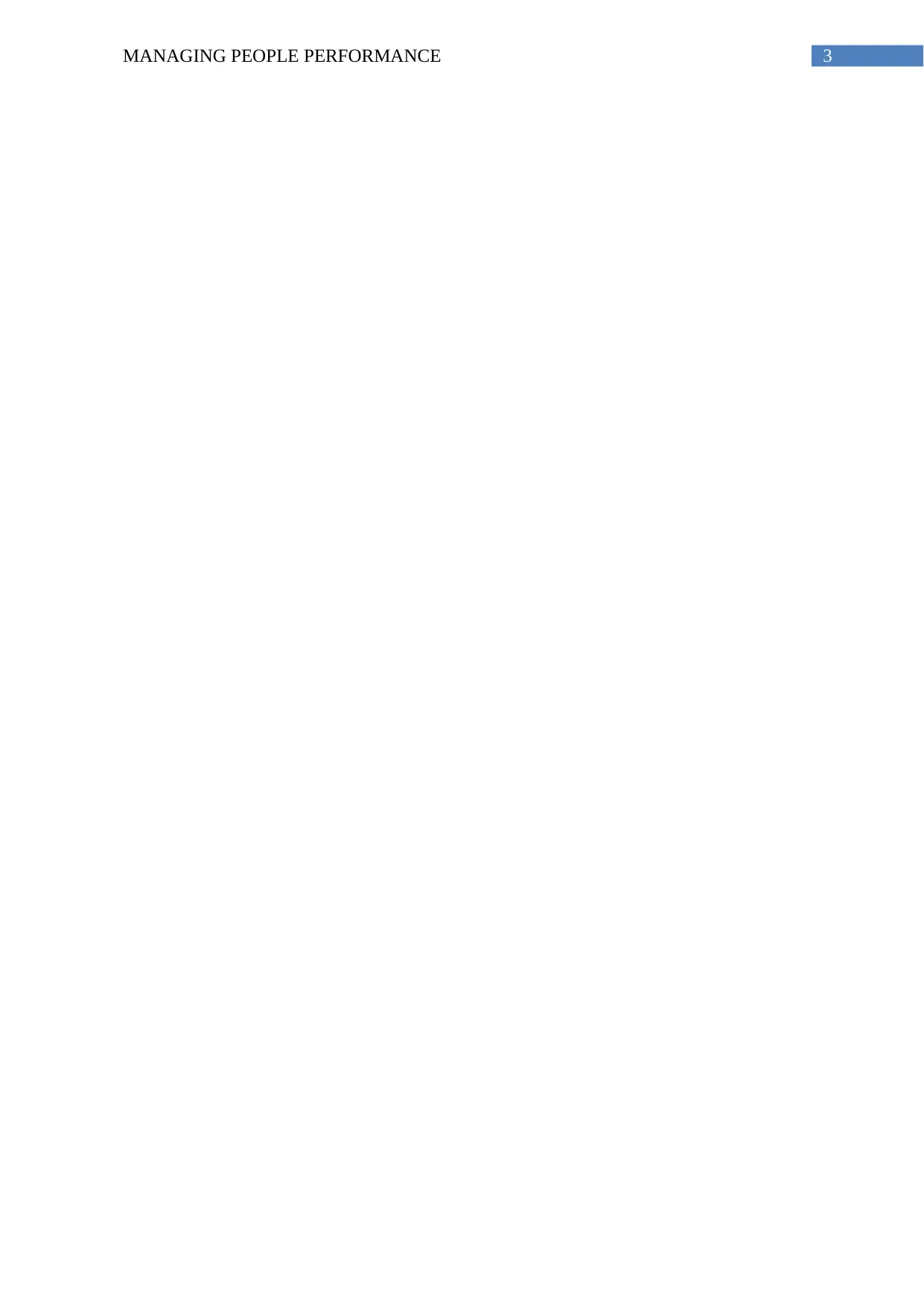
3MANAGING PEOPLE PERFORMANCE
Paraphrase This Document
Need a fresh take? Get an instant paraphrase of this document with our AI Paraphraser
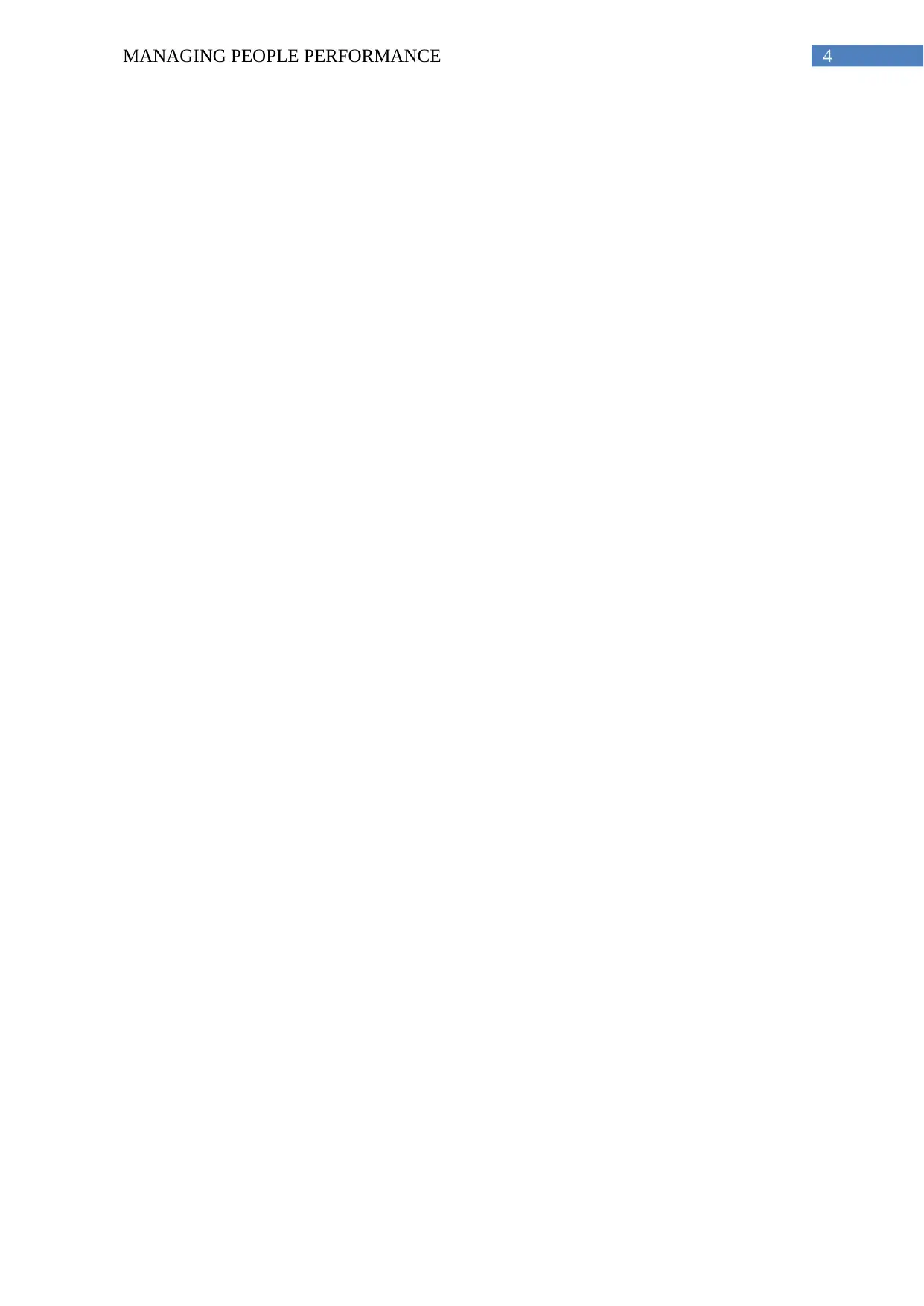
4MANAGING PEOPLE PERFORMANCE
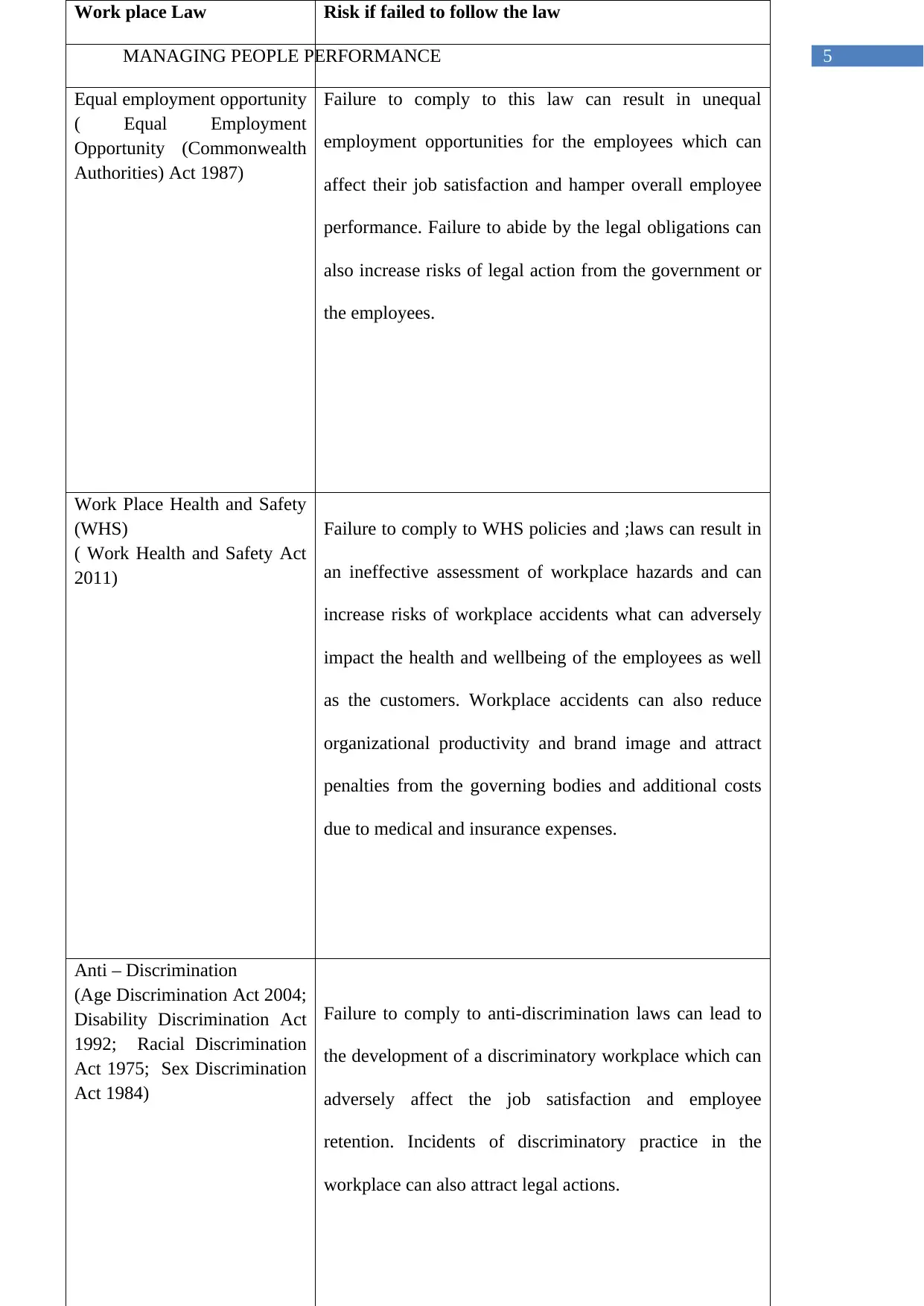
5MANAGING PEOPLE PERFORMANCE
Work place Law Risk if failed to follow the law
Equal employment opportunity
( Equal Employment
Opportunity (Commonwealth
Authorities) Act 1987)
Failure to comply to this law can result in unequal
employment opportunities for the employees which can
affect their job satisfaction and hamper overall employee
performance. Failure to abide by the legal obligations can
also increase risks of legal action from the government or
the employees.
Work Place Health and Safety
(WHS)
( Work Health and Safety Act
2011)
Failure to comply to WHS policies and ;laws can result in
an ineffective assessment of workplace hazards and can
increase risks of workplace accidents what can adversely
impact the health and wellbeing of the employees as well
as the customers. Workplace accidents can also reduce
organizational productivity and brand image and attract
penalties from the governing bodies and additional costs
due to medical and insurance expenses.
Anti – Discrimination
(Age Discrimination Act 2004;
Disability Discrimination Act
1992; Racial Discrimination
Act 1975; Sex Discrimination
Act 1984)
Failure to comply to anti-discrimination laws can lead to
the development of a discriminatory workplace which can
adversely affect the job satisfaction and employee
retention. Incidents of discriminatory practice in the
workplace can also attract legal actions.
Work place Law Risk if failed to follow the law
Equal employment opportunity
( Equal Employment
Opportunity (Commonwealth
Authorities) Act 1987)
Failure to comply to this law can result in unequal
employment opportunities for the employees which can
affect their job satisfaction and hamper overall employee
performance. Failure to abide by the legal obligations can
also increase risks of legal action from the government or
the employees.
Work Place Health and Safety
(WHS)
( Work Health and Safety Act
2011)
Failure to comply to WHS policies and ;laws can result in
an ineffective assessment of workplace hazards and can
increase risks of workplace accidents what can adversely
impact the health and wellbeing of the employees as well
as the customers. Workplace accidents can also reduce
organizational productivity and brand image and attract
penalties from the governing bodies and additional costs
due to medical and insurance expenses.
Anti – Discrimination
(Age Discrimination Act 2004;
Disability Discrimination Act
1992; Racial Discrimination
Act 1975; Sex Discrimination
Act 1984)
Failure to comply to anti-discrimination laws can lead to
the development of a discriminatory workplace which can
adversely affect the job satisfaction and employee
retention. Incidents of discriminatory practice in the
workplace can also attract legal actions.
⊘ This is a preview!⊘
Do you want full access?
Subscribe today to unlock all pages.

Trusted by 1+ million students worldwide
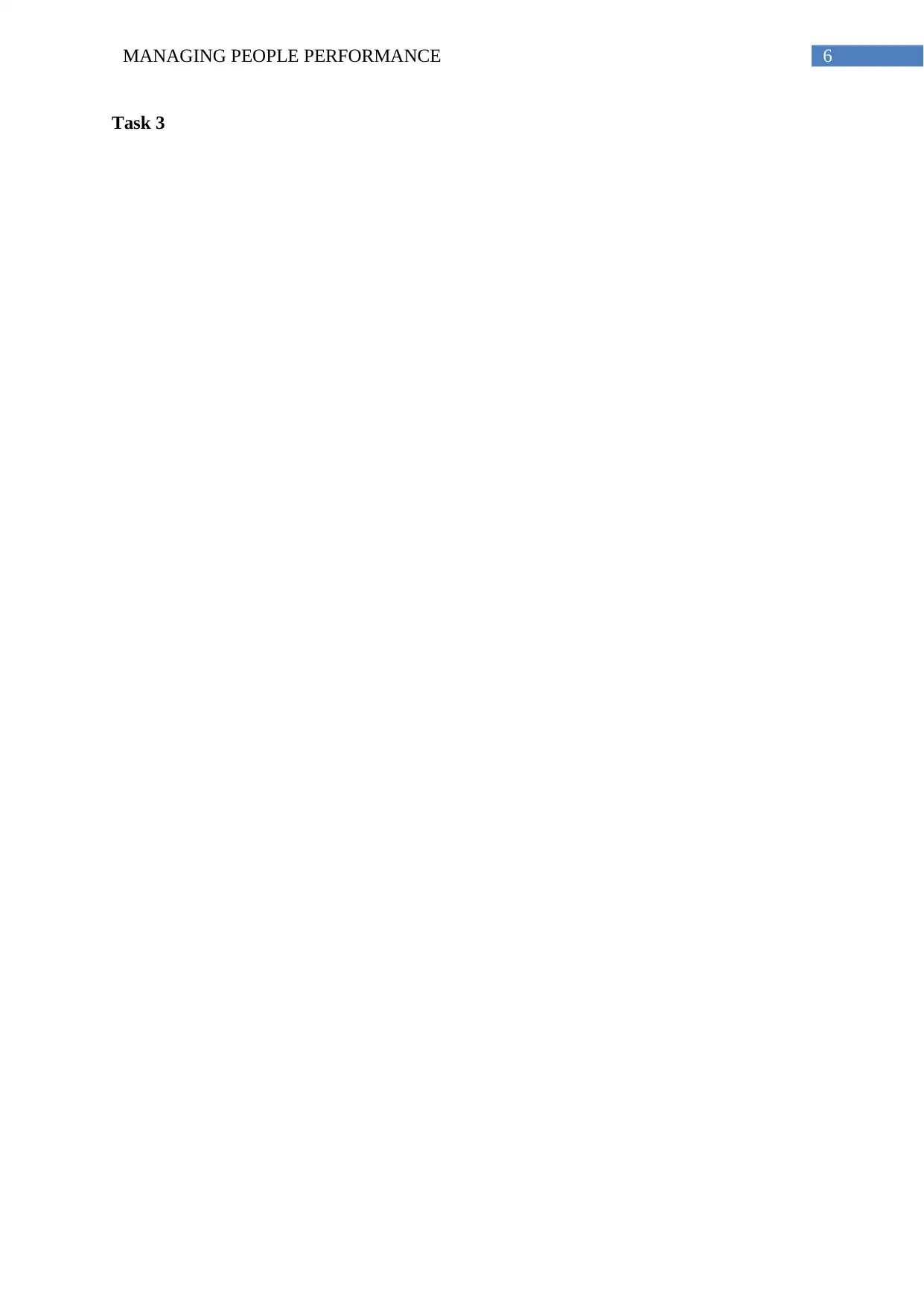
6MANAGING PEOPLE PERFORMANCE
Task 3
Task 3
Paraphrase This Document
Need a fresh take? Get an instant paraphrase of this document with our AI Paraphraser
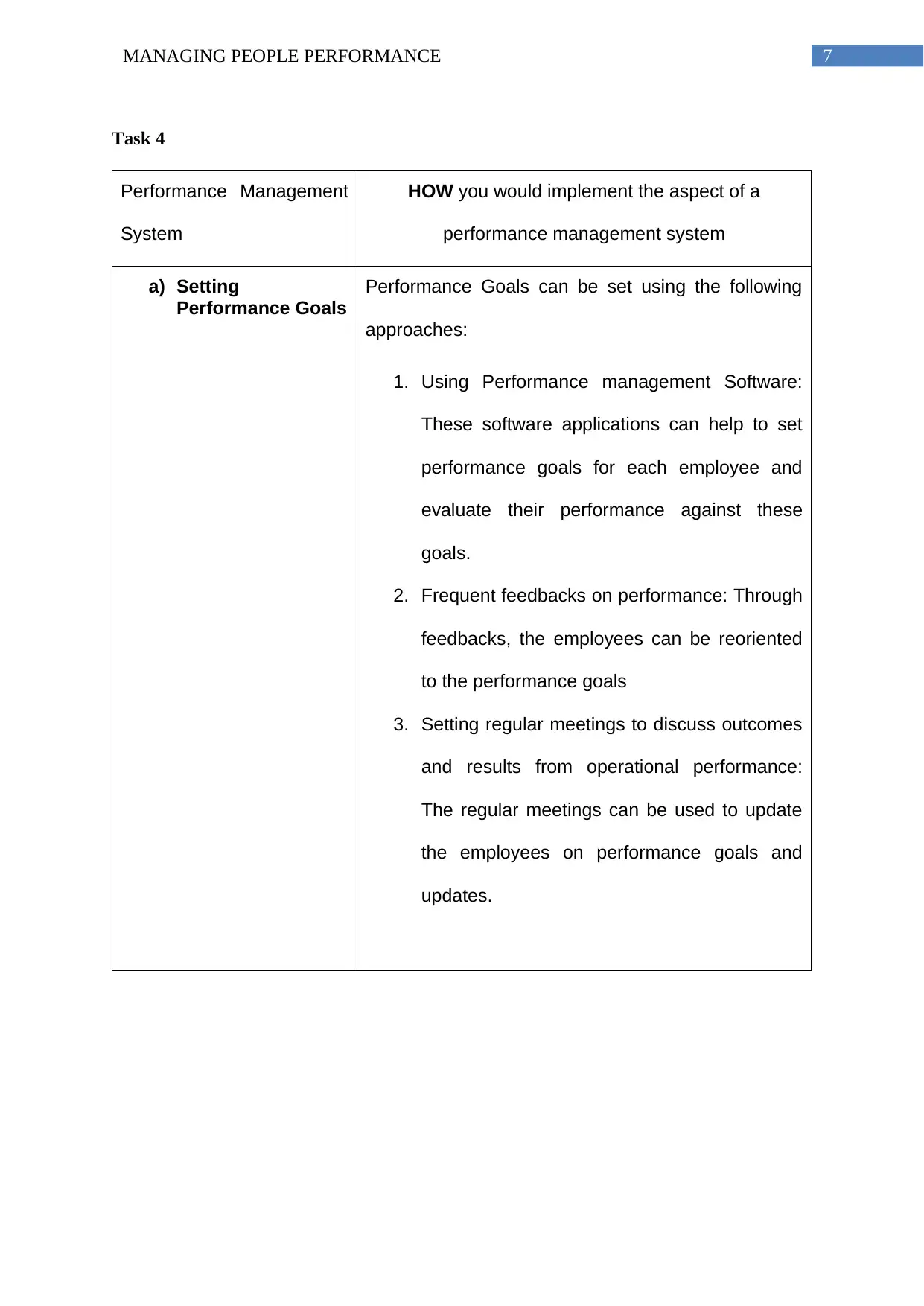
7MANAGING PEOPLE PERFORMANCE
Task 4
Performance Management
System
HOW you would implement the aspect of a
performance management system
a) Setting
Performance Goals
Performance Goals can be set using the following
approaches:
1. Using Performance management Software:
These software applications can help to set
performance goals for each employee and
evaluate their performance against these
goals.
2. Frequent feedbacks on performance: Through
feedbacks, the employees can be reoriented
to the performance goals
3. Setting regular meetings to discuss outcomes
and results from operational performance:
The regular meetings can be used to update
the employees on performance goals and
updates.
Task 4
Performance Management
System
HOW you would implement the aspect of a
performance management system
a) Setting
Performance Goals
Performance Goals can be set using the following
approaches:
1. Using Performance management Software:
These software applications can help to set
performance goals for each employee and
evaluate their performance against these
goals.
2. Frequent feedbacks on performance: Through
feedbacks, the employees can be reoriented
to the performance goals
3. Setting regular meetings to discuss outcomes
and results from operational performance:
The regular meetings can be used to update
the employees on performance goals and
updates.
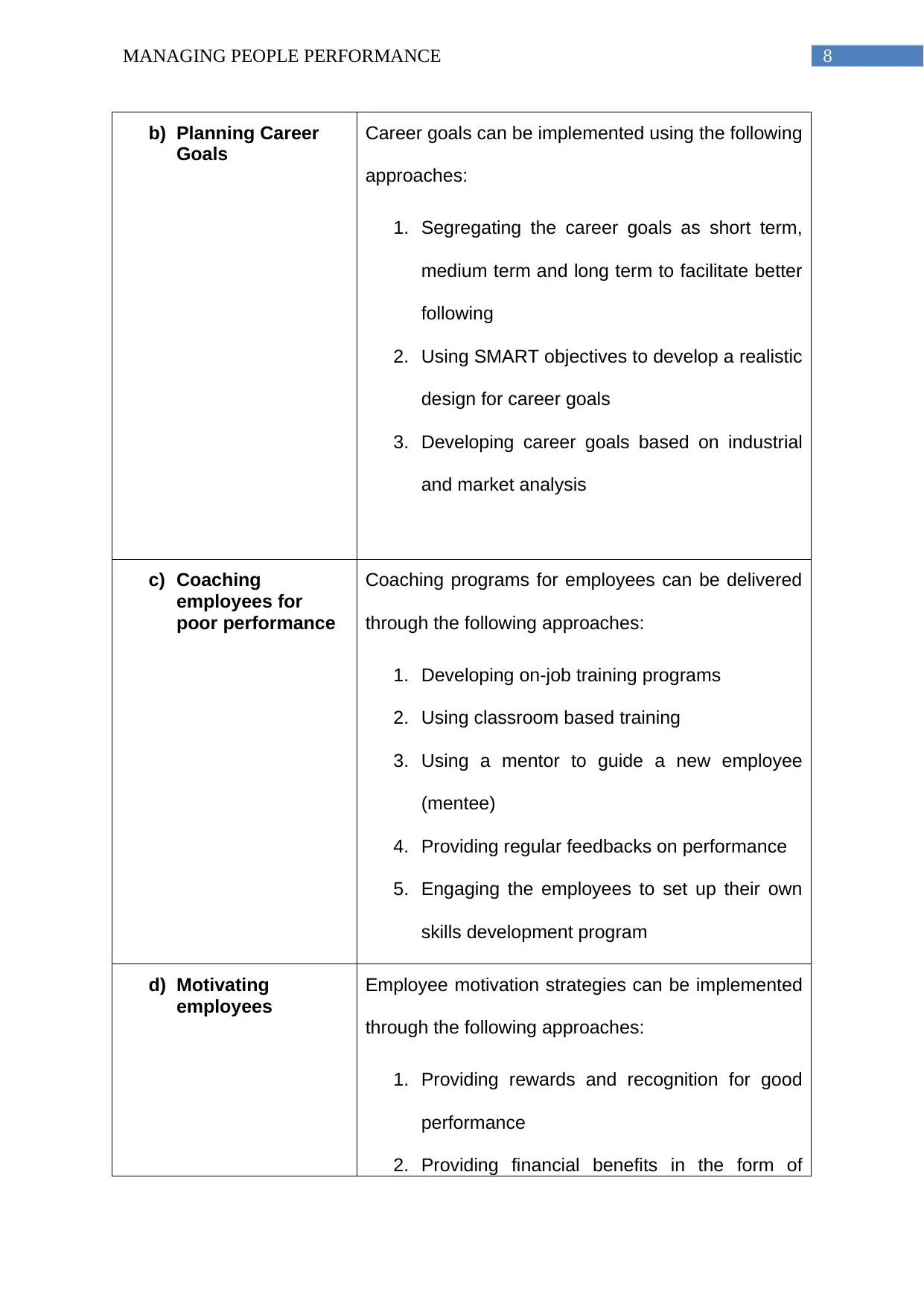
8MANAGING PEOPLE PERFORMANCE
b) Planning Career
Goals
Career goals can be implemented using the following
approaches:
1. Segregating the career goals as short term,
medium term and long term to facilitate better
following
2. Using SMART objectives to develop a realistic
design for career goals
3. Developing career goals based on industrial
and market analysis
c) Coaching
employees for
poor performance
Coaching programs for employees can be delivered
through the following approaches:
1. Developing on-job training programs
2. Using classroom based training
3. Using a mentor to guide a new employee
(mentee)
4. Providing regular feedbacks on performance
5. Engaging the employees to set up their own
skills development program
d) Motivating
employees
Employee motivation strategies can be implemented
through the following approaches:
1. Providing rewards and recognition for good
performance
2. Providing financial benefits in the form of
b) Planning Career
Goals
Career goals can be implemented using the following
approaches:
1. Segregating the career goals as short term,
medium term and long term to facilitate better
following
2. Using SMART objectives to develop a realistic
design for career goals
3. Developing career goals based on industrial
and market analysis
c) Coaching
employees for
poor performance
Coaching programs for employees can be delivered
through the following approaches:
1. Developing on-job training programs
2. Using classroom based training
3. Using a mentor to guide a new employee
(mentee)
4. Providing regular feedbacks on performance
5. Engaging the employees to set up their own
skills development program
d) Motivating
employees
Employee motivation strategies can be implemented
through the following approaches:
1. Providing rewards and recognition for good
performance
2. Providing financial benefits in the form of
⊘ This is a preview!⊘
Do you want full access?
Subscribe today to unlock all pages.

Trusted by 1+ million students worldwide
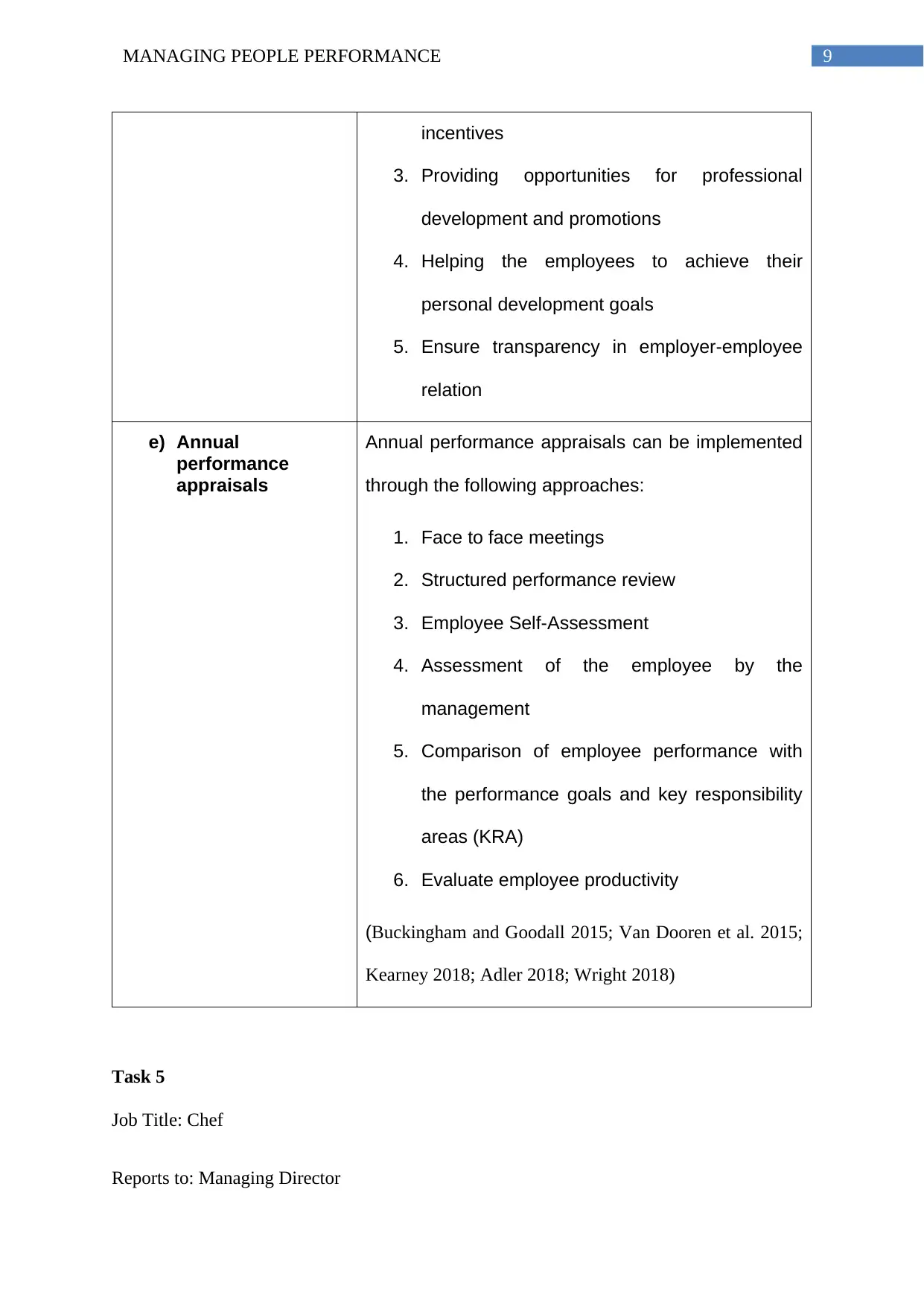
9MANAGING PEOPLE PERFORMANCE
incentives
3. Providing opportunities for professional
development and promotions
4. Helping the employees to achieve their
personal development goals
5. Ensure transparency in employer-employee
relation
e) Annual
performance
appraisals
Annual performance appraisals can be implemented
through the following approaches:
1. Face to face meetings
2. Structured performance review
3. Employee Self-Assessment
4. Assessment of the employee by the
management
5. Comparison of employee performance with
the performance goals and key responsibility
areas (KRA)
6. Evaluate employee productivity
(Buckingham and Goodall 2015; Van Dooren et al. 2015;
Kearney 2018; Adler 2018; Wright 2018)
Task 5
Job Title: Chef
Reports to: Managing Director
incentives
3. Providing opportunities for professional
development and promotions
4. Helping the employees to achieve their
personal development goals
5. Ensure transparency in employer-employee
relation
e) Annual
performance
appraisals
Annual performance appraisals can be implemented
through the following approaches:
1. Face to face meetings
2. Structured performance review
3. Employee Self-Assessment
4. Assessment of the employee by the
management
5. Comparison of employee performance with
the performance goals and key responsibility
areas (KRA)
6. Evaluate employee productivity
(Buckingham and Goodall 2015; Van Dooren et al. 2015;
Kearney 2018; Adler 2018; Wright 2018)
Task 5
Job Title: Chef
Reports to: Managing Director
Paraphrase This Document
Need a fresh take? Get an instant paraphrase of this document with our AI Paraphraser
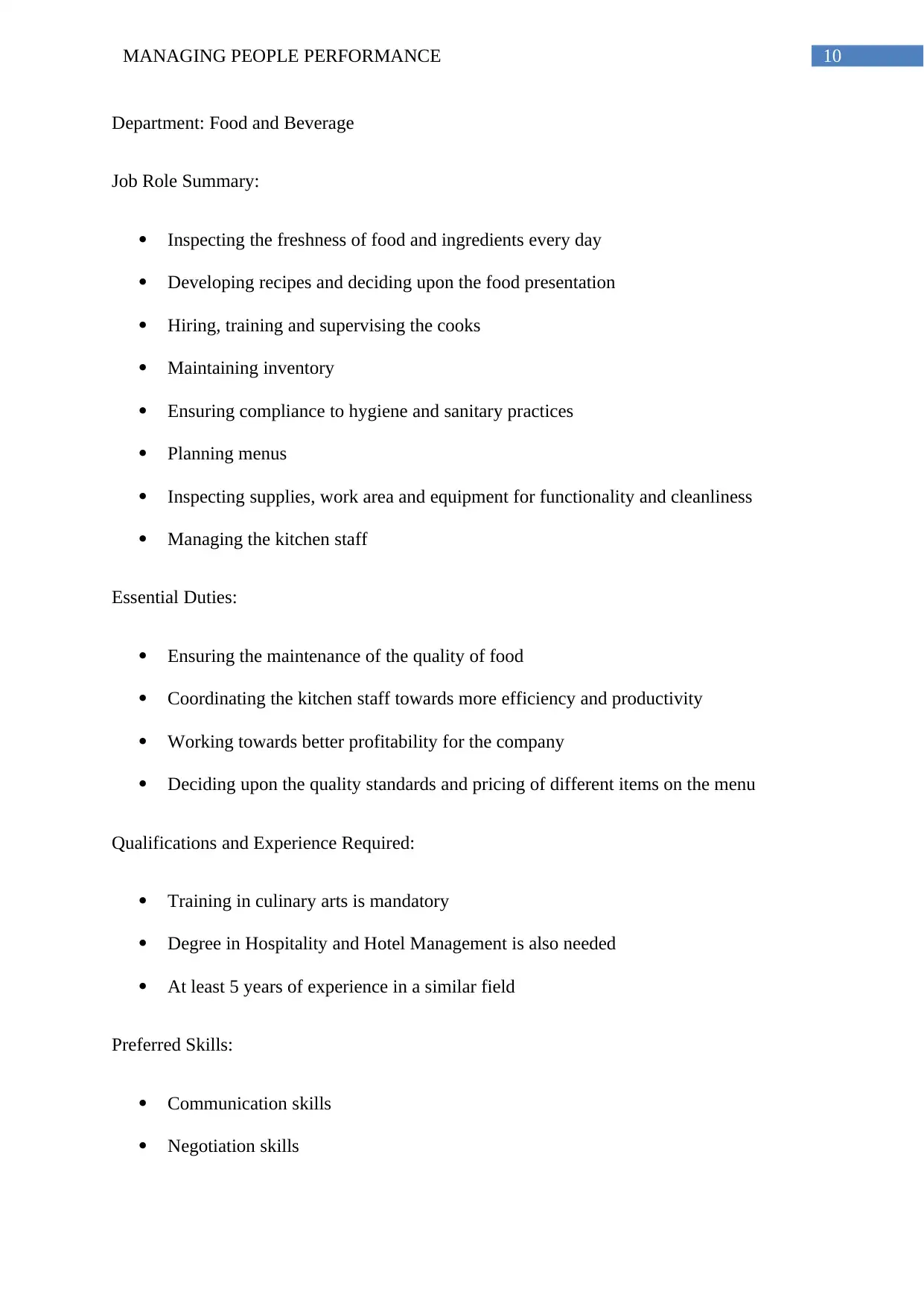
10MANAGING PEOPLE PERFORMANCE
Department: Food and Beverage
Job Role Summary:
Inspecting the freshness of food and ingredients every day
Developing recipes and deciding upon the food presentation
Hiring, training and supervising the cooks
Maintaining inventory
Ensuring compliance to hygiene and sanitary practices
Planning menus
Inspecting supplies, work area and equipment for functionality and cleanliness
Managing the kitchen staff
Essential Duties:
Ensuring the maintenance of the quality of food
Coordinating the kitchen staff towards more efficiency and productivity
Working towards better profitability for the company
Deciding upon the quality standards and pricing of different items on the menu
Qualifications and Experience Required:
Training in culinary arts is mandatory
Degree in Hospitality and Hotel Management is also needed
At least 5 years of experience in a similar field
Preferred Skills:
Communication skills
Negotiation skills
Department: Food and Beverage
Job Role Summary:
Inspecting the freshness of food and ingredients every day
Developing recipes and deciding upon the food presentation
Hiring, training and supervising the cooks
Maintaining inventory
Ensuring compliance to hygiene and sanitary practices
Planning menus
Inspecting supplies, work area and equipment for functionality and cleanliness
Managing the kitchen staff
Essential Duties:
Ensuring the maintenance of the quality of food
Coordinating the kitchen staff towards more efficiency and productivity
Working towards better profitability for the company
Deciding upon the quality standards and pricing of different items on the menu
Qualifications and Experience Required:
Training in culinary arts is mandatory
Degree in Hospitality and Hotel Management is also needed
At least 5 years of experience in a similar field
Preferred Skills:
Communication skills
Negotiation skills
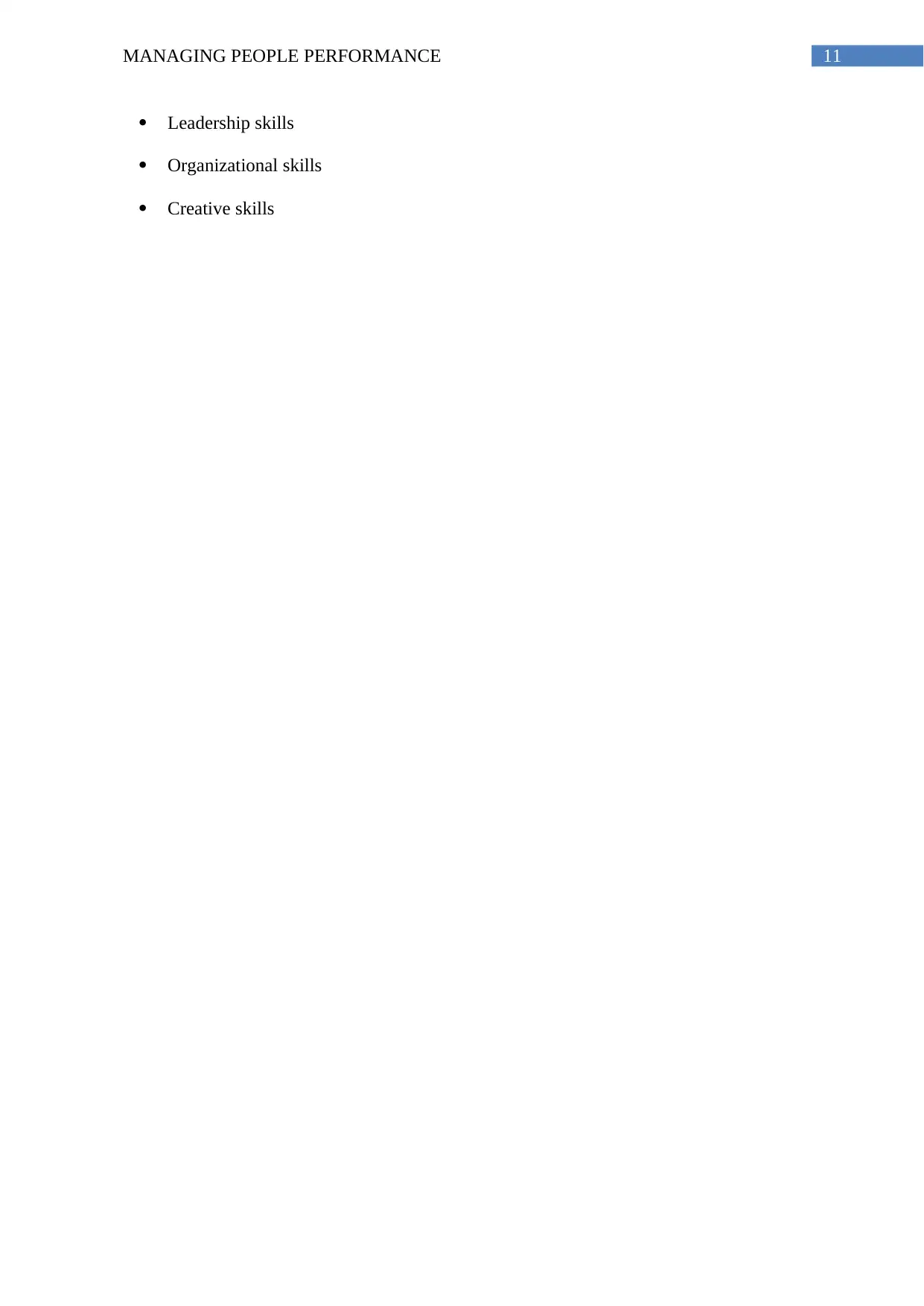
11MANAGING PEOPLE PERFORMANCE
Leadership skills
Organizational skills
Creative skills
Leadership skills
Organizational skills
Creative skills
⊘ This is a preview!⊘
Do you want full access?
Subscribe today to unlock all pages.

Trusted by 1+ million students worldwide
1 out of 25
Related Documents
Your All-in-One AI-Powered Toolkit for Academic Success.
+13062052269
info@desklib.com
Available 24*7 on WhatsApp / Email
![[object Object]](/_next/static/media/star-bottom.7253800d.svg)
Unlock your academic potential
Copyright © 2020–2025 A2Z Services. All Rights Reserved. Developed and managed by ZUCOL.





